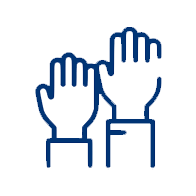DV-alert
Domestic Violence Response Training
Nationally Recognised Training
As a nationally recognised training program, DV-alert is mapped out against the unit of competency CCHCDFV001 – Recognise and Respond to Domestic and Family Violence. Participants who complete the training and assessment will receive a statement of attainment. Find out more about the benefits of DV-alert.
For more detailed information and for bookings, visit dvalert.org.au
Please get in touch with us if you’d like to discuss your training needs – training@llsc.org.au
What is included?
CHCDFV001 – Recognise and Respond to Domestic and Family Violence
Lifeline South Coast on behalf of Lifeline Australia RTO 88036 delivers DV-alert, Lifeline’s free nationally recognised training program that enables health, allied health and frontline workers to confidently:
- RECOGNISE signs of domestic and family violence
- RESPOND with appropriate care
- REFER affected individuals and families to relevant support services
Since 2007, Lifeline has been delivering DV-alert (previously known as DiVeRT) in different parts of Australia including remote and rural locations. Since it was first developed, DV-alert has expanded to wider range of audiences to provide a more tailored approach that recognises the complexities of domestic and family violence as an issue.
DV-alert is funded by the Department of Social Services and is supported to contribute to one of the outcomes of the National Plan to Reduce Violence Against Women and their Children 2010-2022 – services meet the needs of women and children experiencing domestic and family violence.
Courses
Register your interest for Lifeline events
October 2024
Mon 28 Oct 2024 - Tue 29 Oct 2024
09:00 AM - 05:00 PM (2 days)
Free, nationally accredited training to help frontline workers recognise the signs of domestic and family violence, and know what to do next.
More InformationNovember 2024
Thu 14 Nov 2024
09:00 AM - 05:00 PM (1 day)
As a participant in this comprehensive training, you will learn how to recognise the signs of domestic and family violence, and how to respond appropriately within culturally and linguistically diverse communities.
More InformationTue 26 Nov 2024 - Wed 27 Nov 2024
09:00 AM - 05:00 PM (2 days)
As a participant in this comprehensive training, you will learn how to recognise the signs of domestic and family violence, how to respond appropriately, and how to refer people to appropriate support services in Aboriginal and Torres Strait Islander communities.
More InformationOther Training Workshops
Accidental Counsellor Foundation
Learn how to respond appropriately, efficiently and effectively to people in crisis or distress.
ASIST
Learn to recognise the warning signs of suicidality, intervene and help increase their immediate safety.
Mental Health First Aid
Learn how to support a friend, family member or co-worker who is experiencing a mental health crisis.
Psychological First Aid
Learn how to provide support to people impacted by a disaster or critical event and aid Community Recovery
QPR
Learn to recognise the warning signs of a suicide crisis and how to question, persuade, and refer someone to help.














